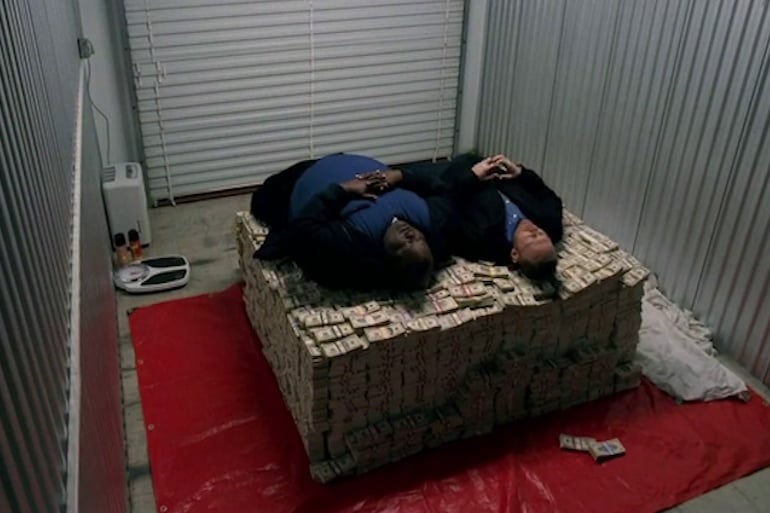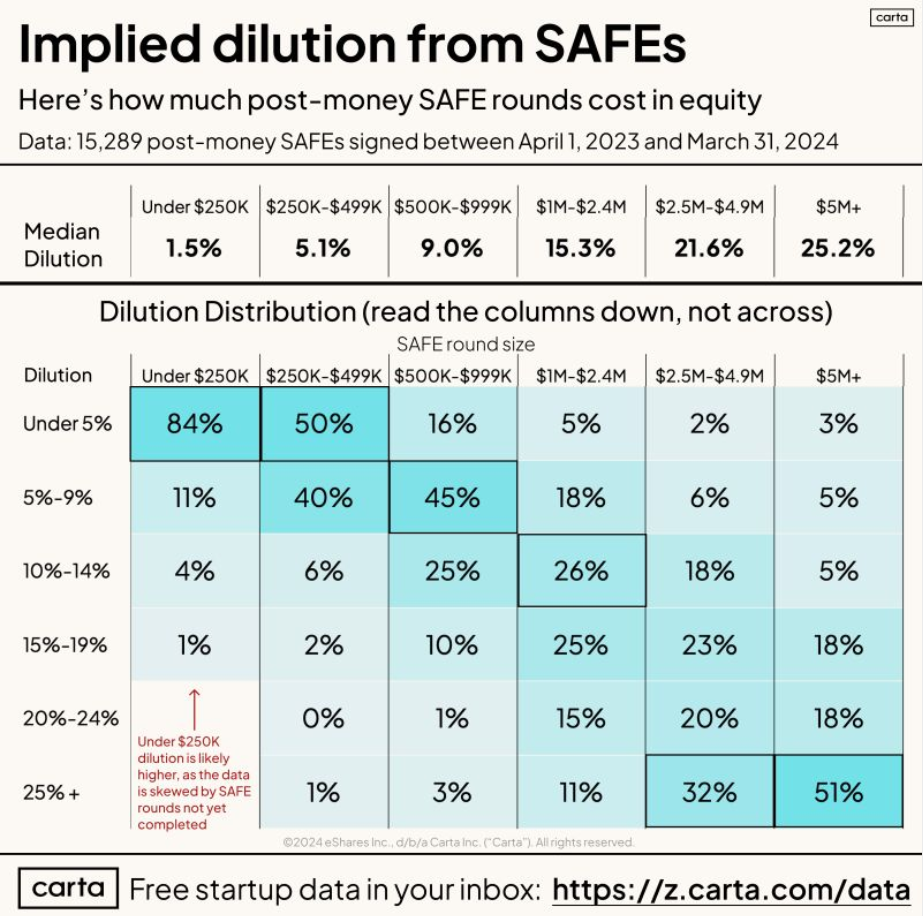Away from the VC mega-round headlines or the hard stories of founders who can’t raise capital at any price, is the solvable problem of how much money a new founder should raise.
I’ve participated in hundreds of investments where founders have opted for different answers to this question, and watched the consequences unfold over the next (usually seed) and subsequent alphabet of rounds.
The most common mistake I see is raising too much capital too early.
It’s easy to believe that more cash (and a higher valuation) increase your chances of success as a founder.
However, here’s why a massive influx of cash early can actually hinder a startup:
1. Dilution
Raising more cash early has a dilutionary effect on founders.
Don’t believe me? Trust Carta – across ~15,000 deals big raises saw more material dilution (~25% dilution at a $5M raise) than those raising <$1M (~9% dilution).
The implicit bet being made is that more cash now (at today’s valuation) is better than cash tomorrow (at a higher valuation based on likely progress).
It’s often said a VC’s fund size is its strategy. A founder should have their own strategy to optimise their economic outcome; not be at the mercy of a fund’s investment strategy and their desire to deploy a lot of cash.
2. Lack of focus
With millions in the bank it’s tempting to pursue too many initiatives for too long (ie a scattergun approach to growth) or focus on the wrong things (eg a nice office, fancy furniture, high founder salaries, internal “alignment” meetings and navel-gazing, etc) rather than customers and product.
Inevitably the plan will be designed to match the funding and all problems will look like ones that can be solved by more cash.
Paradoxically, it can often take longer to find product market fit with all the distractions of a larger team and more time!
It can hide some fundamental business problems for longer (eg poor unit economics). Worse, with a longer cash runway, there is often not a lot of urgency, which can translate to not enough progress – a killer for any startup in a competitive space!
3. Hiring the wrong people
More money increases the temptation to hire more people than you need (senior people, people managers) too quickly before there is real work to do.
When the traction isn’t there (hello founders who try to outsource sales rather than doing founder led sales to start), this leads to a round of expensive firings and a hit to morale for the remaining team.
4. Attracting the wrong investors
It’s a great ego boost to get a lot of money, particularly from someone with deep pockets and a bunch of experience at later stage deal making.
These investors may lack the experience to help you with early stage problems, may be a negative for other later stage investors (ie you’ve picked a mid stage funding partner too early), and if they don’t follow on (it happens, more than you’d think) it’s a big negative signal for any others in the ecosystem.
To a later stage VC with a $1B fund a $5M investment is only 0.5% of the fund (ie not material); to a $25M fund a $500K investment is 4 times as important to them – and so you are likely to get more support and time from the smaller fund.
5. Higher expectations
With more cash, comes higher investor and public expectations and less tolerance of missteps.
Some founders find the added pressure and scrutiny hard to endure, particularly where they don’t know exactly where they are going to deploy the cash.
We can see the impact of this pressure on some of the crazy behaviour of founders of some very high profile startup failures and the impact of negative press on company prospects.
6. Lower future valuations
In the short term a business will often be able to raise a subsequent round (particularly with a supportive VC who doesn’t want the embarrassment of a down round) but as we’ve all seen recently the market will eventually grade you on your results vs the rest of the market.
If you can’t produce the required metrics, punishing down rounds and pay to play rounds can effectively wipe out all that “paper” wealth (particularly for founders with ordinary shares).
Alternative strategies
Capital is crucial, but it doesn’t guarantee success and is not a magic growth elixir.
So, what’s the alternative?
Focus on fundamentals for your stage
Yes, you want to dominate your space as quickly as possible but before going for capital to scale or have that flashy office, nail the product, build a strong team, and validate market fit.
It can actually turn off investors that a company has raised a lot of cash – we are after results commensurate with the capital deployed ;-).
Investors will be more impressed by a lean, focused company with traction than a bloated one with (unrealised) potential.
Raise what you need; not what you can
Raise what capital you need to make the business more valuable and achieve specific milestones.
If things are going well, more capital (at higher valuations) will be easy to obtain and you’ll have more suitors to choose from.
Capital efficiency keeps focus sharp and a culture of frugality (which is hard to instil once lost). It also makes it easier to pivot with less baggage and a smaller team.
Have a strategy and do the maths
Raising less money now at a lower valuation and raising more at a higher valuation later can be a much better medium term strategy for founders, and give more ownership with less risk.
A startup is a marathon not a sprint.
Building a successful company requires discipline, focus, and a healthy dose of scrappiness.
Don’t let a tidal wave of cash lull you into a false sense of security or drown your entrepreneurial spirit.





















Trending
Daily startup news and insights, delivered to your inbox.